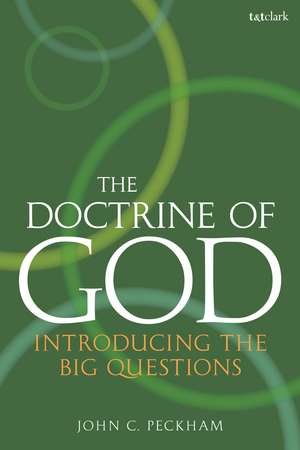The Doctrine of God: Introducing the Big Questions
Autor Professor John C. Peckhamen Limba Engleză Paperback – 4 sep 2019
| Toate formatele și edițiile | Preț | Express |
|---|---|---|
| Paperback (1) | 193.18 lei 6-8 săpt. | |
| Bloomsbury Publishing – 4 sep 2019 | 193.18 lei 6-8 săpt. | |
| Hardback (1) | 569.76 lei 6-8 săpt. | |
| Bloomsbury Publishing – 4 sep 2019 | 569.76 lei 6-8 săpt. |
Preț: 193.18 lei
Preț vechi: 236.69 lei
-18% Nou
Puncte Express: 290
Preț estimativ în valută:
36.96€ • 38.70$ • 30.59£
36.96€ • 38.70$ • 30.59£
Carte tipărită la comandă
Livrare economică 05-19 aprilie
Preluare comenzi: 021 569.72.76
Specificații
ISBN-13: 9780567677846
ISBN-10: 0567677842
Pagini: 272
Dimensiuni: 156 x 234 x 23 mm
Greutate: 0.43 kg
Editura: Bloomsbury Publishing
Colecția T&T Clark
Locul publicării:London, United Kingdom
ISBN-10: 0567677842
Pagini: 272
Dimensiuni: 156 x 234 x 23 mm
Greutate: 0.43 kg
Editura: Bloomsbury Publishing
Colecția T&T Clark
Locul publicării:London, United Kingdom
Caracteristici
Surveys the most prominent options in Christian theology relative to divine attributes and the God-world relationship
Notă biografică
John C. Peckham is Professor of Theology and Christian Philosophy, Andrews University, USA.
Cuprins
PrefaceAcknowledgmentsAbbreviationsIntroduction to the Doctrine of GodChapter 1: Does God Change? Does God Have Emotions?Chapter 2: Does God Have a Future?Chapter 3: Can God Do Anything and Everything?Chapter 4: Does God Cause Everything? Does God Always Get What He Wants?Chapter 5: Does God Know Everything? Does God Know the Future?Chapter 6: Is God Entirely Good and Loving? Why Evil?Chapter 7: How Can God Be One and Three?Concluding ReflectionsBibliographyIndex
Recenzii
Laudably even-handed and researched, elegantly written and explicated, Peckham's eagerly anticipated, student-friendly contribution is a treasure trove. Exploring God's existence is valuable; asking who God is priceless. Peckham investigates the latter by deftly navigating an expansive, philosophically and theologically sophisticated literature to mine substantive doctrine with fertile and far-reaching implications.
No aspect of Christian faith is more important, or more controversial, than the doctrine of God. And few explorations of this doctrine are as informed, clear, and well organized as John Peckham's. His book provides an attractive introduction to God's central attributes, the questions they traditionally raise, and some of the influential answers recent thinkers have proposed.
This is a terrific little book on the biggest of all issues. The discussion is biblically driven and deeply informed by, and conversant with, the best philosophical and theological literature. It is an excellent account of the current state of the debate and will be an ideal text for introductory theology courses.
In his survey of Christian theism, John Peckham again demonstrates why he wins the hearts and minds even of those who diverge from him. Clearly tracing the outlines of divine immutability, eternality, omniscience, omnipotence, and impassibility, Peckham enlivens his portrait with the color of Christian debate over our construal of revelation and philosophy regarding who God is. This will likely become the standard introductory text to this fast growing field of theological discourse.
This is an excellent guide for students to the key terms, positions, and names in contemporary discussions of the doctrine of God. The book is so well organized that it will be immediately helpful as an introduction. Peckham is a clear writer with a sharp eye for big ideas, central claims, and definitive statements.
No aspect of Christian faith is more important, or more controversial, than the doctrine of God. And few explorations of this doctrine are as informed, clear, and well organized as John Peckham's. His book provides an attractive introduction to God's central attributes, the questions they traditionally raise, and some of the influential answers recent thinkers have proposed.
This is a terrific little book on the biggest of all issues. The discussion is biblically driven and deeply informed by, and conversant with, the best philosophical and theological literature. It is an excellent account of the current state of the debate and will be an ideal text for introductory theology courses.
In his survey of Christian theism, John Peckham again demonstrates why he wins the hearts and minds even of those who diverge from him. Clearly tracing the outlines of divine immutability, eternality, omniscience, omnipotence, and impassibility, Peckham enlivens his portrait with the color of Christian debate over our construal of revelation and philosophy regarding who God is. This will likely become the standard introductory text to this fast growing field of theological discourse.
This is an excellent guide for students to the key terms, positions, and names in contemporary discussions of the doctrine of God. The book is so well organized that it will be immediately helpful as an introduction. Peckham is a clear writer with a sharp eye for big ideas, central claims, and definitive statements.
